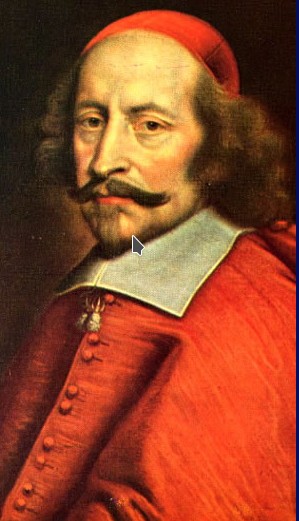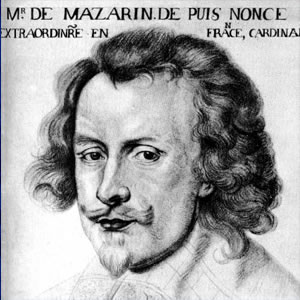 In 1646, d’Artagnan entered the service of Cardinal Mazarin, Prime Minister of France at that time.
In 1646, d’Artagnan entered the service of Cardinal Mazarin, Prime Minister of France at that time.
It was the difficult period of transition known as the Regency, which spanned from the death of Louis XIII to the majority of Louis XIV, then just a boy. Another Gascon, by the name of Besmaux, also served the Cardinal.
That same year saw the dissolution of the First Company of Musketeers.
…Mazarin constituted for himself a clientele of loyalists. The cardinal needed men in which he could have complete faith, men who would serve him with blind loyalty because they were beholden to him. Two young gentlemen could be counted among these men: François de Monlezun, seigneur of Besmaux, and Charles de Castelmore d’Artagnan.
Odile Bordaz
Colbert had said that d’Artagnan was one of Mazarin’s henchmen; nothing could be truer. It was toward 1646, it seems, that d’Artagnan linked his fate to that of the cardinal by becoming, at the same time as Besmaux, one of his gentlemen.
Charles Samaran
Along with a few others, they were among the “ordinary gentlemen” of His Eminence or his “domestics”, as they were also called at that epoch. However, there was absolutely no nuance of contempt attached to these terms. Theirs was the double role of messenger, charged with carrying the most important messages, and political emissary. They were fully committed partisans in the cardinal’s service, who fulfilled the mission of itinerant soldiers, announcing troop movements, informing their master about his enemies’ activities, gathering support [for the cardinal], etc.
Jean-Christian Petitfils
It seems, however, that the two men were not particularly well paid for their services, as the cardinal was not generous with his purse strings. Courtilz “reports” d’Artagnan’s attitude about this: :
A long time we languished before seeing our hopes brought to fruition. Far from giving us the benefits we hoped for, all that this new station procured for us was that it employed us as errand-runners, for which we were given as compensation, sometimes 500 écus, sometimes 100 gold pieces and other times less. But, as we had to spend a good deal, what was left over was so little that we were always made to feel what we were. By that I mean that if we had stockings, we didn’t have shoes…
Courtilz de Sandras
If d’Artagnan did not become rich from serving Mazarin, that certainly did not prevent him from serving obediently and even zealously. The cardinal even entrusted him with missions that only an intelligent and totally trustworthy man could accomplish.
[He] was ceaselessly galloping from one corner of France to the other, and to foreign lands, to carry Mazarin’s letters and instructions. But we would be fooling ourselves to see nothing but a simple delivery boy in d’Artagnan. Mazarin chose indefatigable riders capable of braving storms and dangers, but he also demanded that they be the communicators of his thoughts and his will. Their duty was not only to transmit letters; they also had to be capable of providing oral explanations, receiving information and accurately judging men and situations. Finally, as Mazarin was surrounded by enemies committed to his destruction, his emissaries had to be loyal, their fates joined to his own, and immune to all corruption.
André Laffargue
We catch up with d'Artagnan in Courtrai ...
Here is d’Artagnan riding on the roads of Flanders, where war is waging against Spain and the Habsburg Empire. He had to shuttle constantly between the court and the forts along the frontier, follow troop movements, enemy movements, gather intelligence on [the enemy’s] intentions and transmit all this information to his master. For his part, the cardinal entrusted him with orders for the army commanders of the concerned strongholds.
Odile Bordaz
Or again in Péronne ...
Monsieur d’Artagnan will report to Monsieur d’Hocuquincourt that we have received word from Brussels that the enemy is amassing approximately 3000 men in the region of Hainaut in order to take our garrisons along the frontier by surprise or else as a diversion, entering France at another point which I do not know. This is why he will warn Monsieur d’Hocquincourt to be ready, and he will request that this warning be transmitted to the other governors [of fortress cities]…
Missive to Monsieur d’Artagnan, departing for Péronne on the 9th June 1648
Archives of the French foreign affairs.
 For his part, Mazarin was not in a situation that one could qualify as advantageous. His detractors were becoming more numerous and more vocal, and the rebellion known as the Fronde was figuring on the horizon. It was at this time in particular that d’Artagnan proved himself to be of the utmost loyalty.
For his part, Mazarin was not in a situation that one could qualify as advantageous. His detractors were becoming more numerous and more vocal, and the rebellion known as the Fronde was figuring on the horizon. It was at this time in particular that d’Artagnan proved himself to be of the utmost loyalty.
The hatred that Mazarin engendered was reaching its paroxysm. He was accused of continuing the war against Spain and the Empire unnecessarily and of decimating the public treasury. The administration and the courts were becoming restless. A warrant of arrest for three members of parliament –Charton, Blancmesnil and Broussel –ignited the Fronde on 26th August 1646… The number of the cardinal’s enemies was increasing every day. The majority of the provincial aristocracy, reigned-in by Richelieu but still filled with feudal pride, raised up their heads, determined to reclaim their forgotten rights.
Jean-Christian Petitfils
D’Artagnan was in fact involved in all the events of this particularly chaotic period. Mazarin’s trusted right hand during this time of rebellion, he would also remain loyal to the Queen, Anne of Austria, and to the young King Louis XIV, and he kept a cool head during the first popular uprisings of the Day of the Barricades on 26th August 1646.
Stéphane Baumont
Even as some of their former comrades joined the insurgents, he himself (d’Artagnan) and his friend Besmaux continued to serve the monarchy, along with Marshal Gramont. They accompanied the king, the queen and the cardinal in their tour of France, in the hopes of calming the troubles.
Odile Bordaz
As for d’Artagnan, the cardinal’s agent, he put himself out, going from one mission to another. Why such hard-headed loyalty to a cause that seemed to crumble, when it would have been easy to join the ranks of Condé and his friends, the “little chiefs” as they were called?...
No, the hero of legend, brave and valiant to no end, does not falter!
…He charges off like Captain Fracasse, in search of some starry ideal. Skewering the traitor, splitting the rogue, he wins, he triumphs while avoiding the worst ambushes… D’Artagnan remained obstinately loyal to his queen, to a cardinal that was so abhorred and to a teetering monarchy, which, after all, gave him more merit than the disorganized and turbulent heros of the Fronde.
Jean-Christian Petitfils
Mazarin having been forced to flee the kingdom (March 1651), d’Artagnan served as his emissary, here to the prince elector of Cologne, there to Colbert and other loyal friends remaining in France. On 3rd April, the cardinal, exiled in Aix-la-Chapelle, wrote to Anne of Austria: “I have sent Artaignan to Bonn to transmit my compliments to Monsieur the Elector and to request a castle for my retreat, as the nuncio advised me against going to Cologne, where the people are extremely brutal. I believe I can remain at the castles of Leischnik or Brühl, which are, here and there, two leagues from that city.” Mazarin’s final choice was to stay at Brühl, where he prepared his return to France.
Charles Samaran
During this time the frondists continued their offensive and Mazarin became more and more unpopular. Neither were the men who served him beyond danger.
In Paris, displays of pro-Mazarin sentiment were not well seen. On the Pont-Neuf [the bridge linking the left and right banks of Paris]was posted a notice [offering] “a just reward to compensate anyone who will deliver France from Mazarin” (…) Tireless and taking no heed of the dangers, d’Artagnan crossed the countryside of Lorraine and Champagne from Brühl to Paris and from Paris to Brühl. He needed considerable agility to evade suspicion, to find a secure resting place, to avoid the trunk roads and soldiers on the march, to escape from patrols, and sometimes to gallop across fields…
Jean-Christian Petitfils
I ask that you beseech d’Artagnan to return to me safely and to take precautions that no misfortune might befall him. In God’s name, take your [precautions] as well because if everyone knew to what point you are [pro-] Mazarin, I’m afraid that things could go badly for you.
Letter from Mazarin to Basil Fouquet, 11 January 1652.
The cardinal prized d’Artagnan’s courage and effectiveness. “Being [pro-] Mazarin” was not easy during those years, at a time when an act of Parliament offered a considerable reward to anyone who managed to arrest His Eminence and deliver him for justice. People had begun to put his library for sale. “Mazarinades”, filthy and defamatory pronunciations against the cardinal and the queen, flooded the capital.
Odile Bordaz
D’Artagnan served the cardinal again during his second period of exile. On the road again, he was the liaison between Mazarin and those who remained faithful to him. Meanwhile, the Fronde led by the Prince of Condé was starting to lose the support of the people.
Here Condé figures as the master of Paris, while the King, the Queen Mother and Mazarin are exiled and must remain in Compiègne. But the quartering of Condé and his army within Paris soon provokes such a state of anarchy that the Parisians, infuriated, come to the point of begging the King and the Queen to return to Paris. But, not Mazarin! Anne of Austria refuses to accept this condition. But the cardinal, more savvy, advises her to do accordingly. And to show that he does not wish to pose as an obstacle to peace, he skillfully appears to sacrifice himself by exiling himself for a second time (…) And d’Artagnan can begin shuttling back and forth again.
André Laffargue
A short time later, in October 1652, the King recalled Mazarin to Paris, but the latter decided to wait for things to calm down. He wouldn’t return to Paris until February of the following year, escorted by d’Artagnan and… acclaimed by the masses!
As one approached the capital, an ever denser crowd amassed along the roads to acclaim the returning Italian. After the dark years of the Fronde, this was his apotheosis. In Paris on the 2nd of February, the streets were so filled with people –despite the heavy rain– that it was a wonder the cortege was able to advance through such a tide of humanity. This same short-tempered and fickle people who, a few months earlier, protested loudly against Mazarin, burned his effigy and spat on his supporters!
Jean-Christian Petitfils
It is in this way that Mazarin returned victoriously to the court, and d’Artagnan with him. Our Gascon could now tell himself that he had really bet on the right horse – which never inspires indifference from a man of his kind—but he also began to reap more tangible advantages from [his relationship with the cardinal]. The cardinal was not as ungrateful as he was accused of being towards those who served him well.
Armand Praviel
All these years of abnegation, good and loyal service and unwavering loyalty to Mazarin and to the royalty he represented were to secure d’Artagnan’s future.
Louis XIV, as an adult, remained traumatized by the Fronde, synonym for treason in his eyes.
And he would remember favorably a man like d’Artagnan who had not failed him in his time of need.
